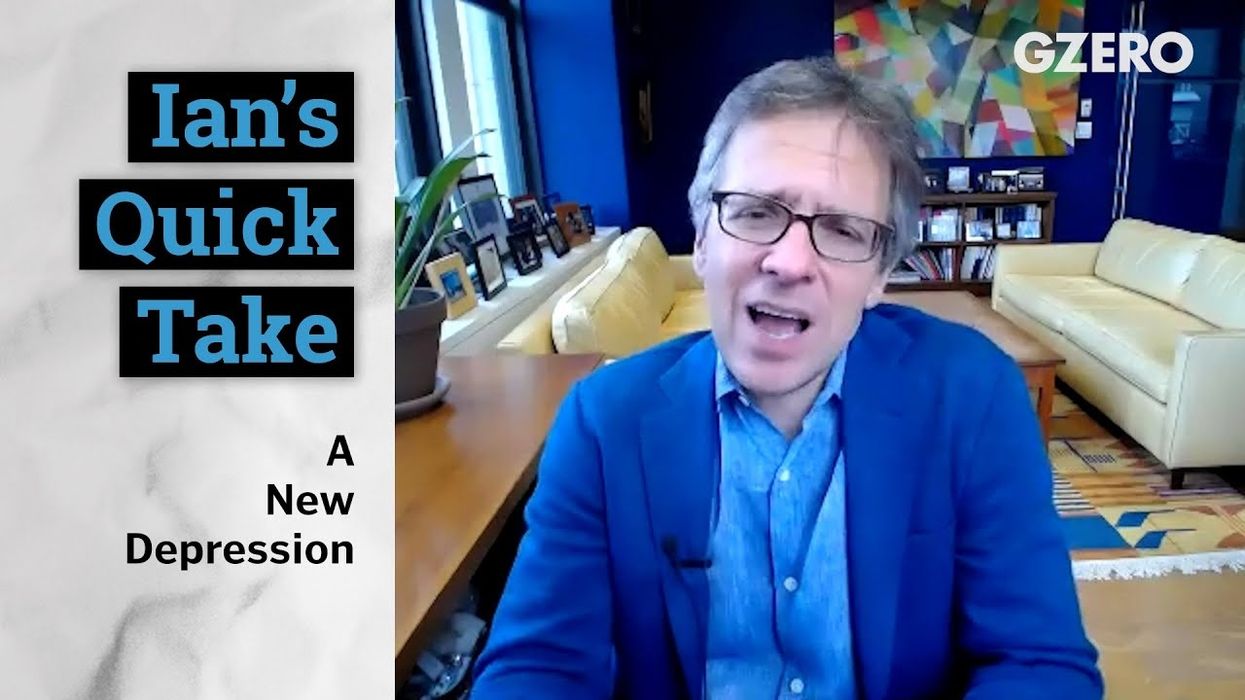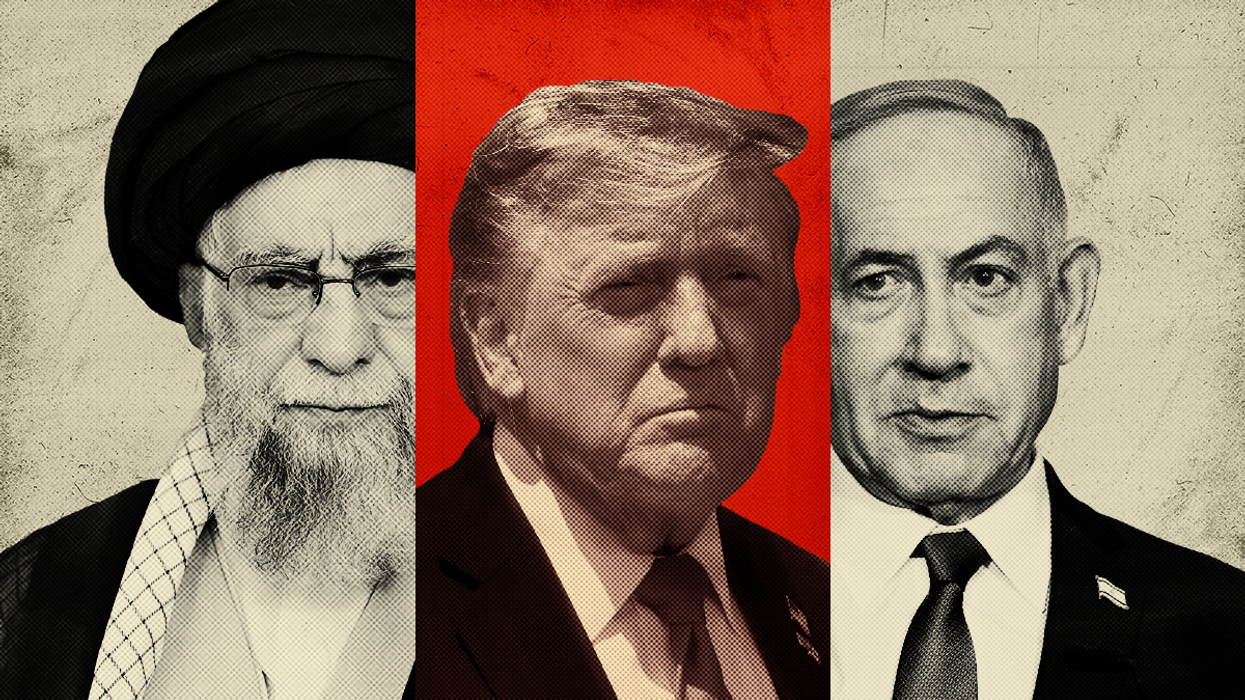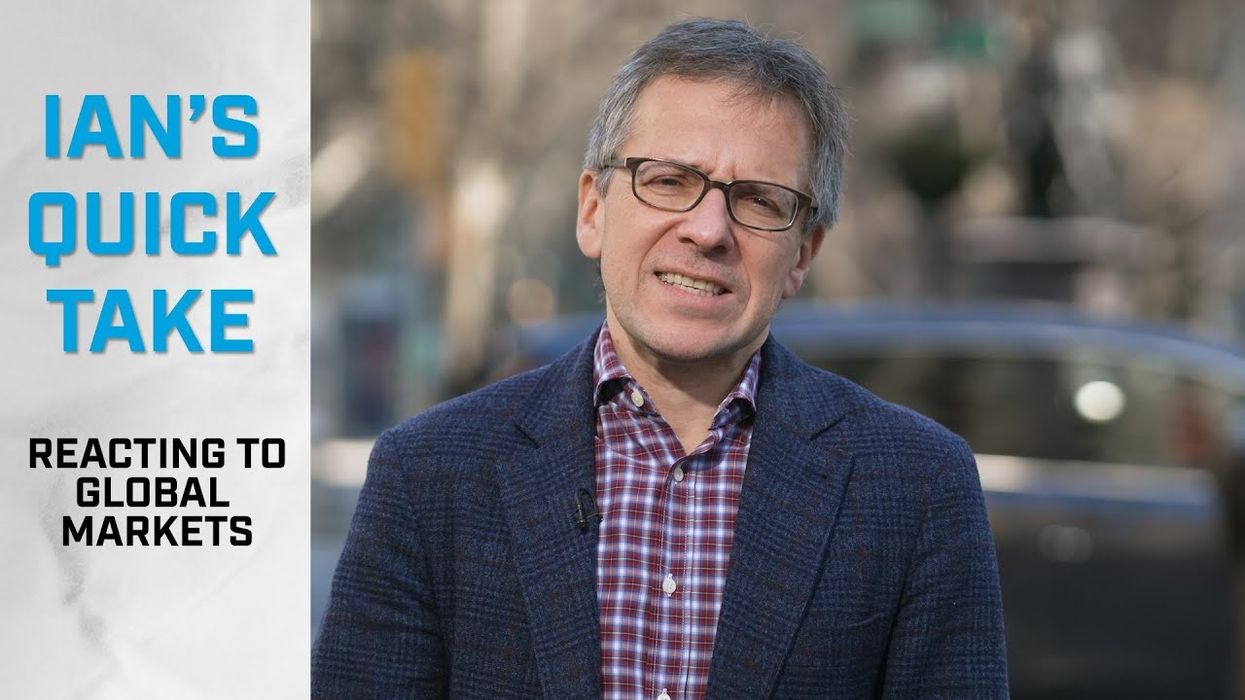VIDEOSGZERO World with Ian BremmerQuick TakePUPPET REGIMEIan ExplainsGZERO ReportsAsk IanGlobal Stage
Site Navigation
Search
Human content,
AI powered search.
Latest Stories
Sign up for GZERO Daily.
Get our latest updates and insights delivered to your inbox.
Global Stage: Live from Munich
WATCH RECORDING
popular
Presented by
What an exciting time to be alive, the middle of a pandemic, the beginning of a depression, the first in a century.
Yes, I said a depression, not a recession. That is indeed what we're looking at. But people don't yet want to call it that. We know what recessions are. A technical recession, two consecutive quarters of contraction. We say the world is in a recession and if global growth is under 2%. We don't have a formal definition of depression. But what we know is that it is materially greater in both depth and duration than a recession. And it's also truly global.
We're checking all the boxes. It's obviously global. Every country in the world is getting hit by this pandemic. And every country in the world is having its economy, both supply and demand side, severely disrupted as a consequence of not having a vaccine for this new disease. We can say the governments say we're going to reopen, but until we can make people immune from coronavirus, they are not going back to work the way they used to. Their desires to consume will not be what they were. The desires for what is and is not essential - entertainment and travel, tourism, you name it - not going to be what it was. We're talking not about six months, three months in, three months out, a nice V-shaped curve, rather three months in and then until we have a vaccine which has been created and which is manufactured at scale, distributed with education around it, we're not back.
I'm optimistic from all of the epidemiologists and scientists and doctors I've talked to that we are going to get a vaccine. But still talking about two to three years and massive impact on the global economy. And then we look at the scale. We have headline numbers of what unemployment looks like in the United States, as of Friday, 14.7%. There were 7 million additional people filing for unemployment after the close of that date. Plus, an additional 5 million plus not characterized as unemployed because they're temporarily furloughed, even though they don't have jobs to go to, and they may not have jobs to come back to. So, the reality in the United States is we're closer to 25%, well over 20%. And the peak of unemployment during the Great Depression was 24.9%.
For all three of these boxes, we are entering depression territory. And no, Trump running for reelection is not going to want to say that. And no, a lot of CEOs and others trying to keep people unpanicked and, share prices high, just keep things going. They're not going to say that, but the reality is that we've entered a depression.
I think it's also important to understand that just because we don't have any experience with depression in our lifetimes does not mean this is the same depression that our great-great-grandfathers and grandmothers lived through. This is going to be much less disruptive. The reason is there's so much more wealth. A global depression today that affects a world that has so much more resource and capital and resilience, its political institutions, its society, its economic institutions, its health care, it's very different than what we experienced during the Great Crash.
Middle income developing countries today are wealthier than the middle class in the United States and Europe was during the Great Depression. You can take a 10% contraction to these major economies, worse in some of the developing world, and it won't have the same level of human deprivation, the same level of of death and destruction economically that we had before. Does that mean we shouldn't care as much about it? No, it matters. The present day is what we pay most attention to. We've got big discount variables for the for the past. And on the basis of how we act, we obviously had big discount variables for the future or else we'd be treating the world very differently. We'd deal with climate change, we'd have resilience for pandemics. But it is important to understand what it is that we're entering. And we characterize it as a big recession. We're going to put it in our minds in terms of 2008-2009. It is very different from that. By 2009, we were well on track for rebound. 2020 life is still very, very different for all of us experiencing this coronavirus depression.
One reason why we've responded to it badly is because the last major pandemic we had, African swine flu, H1N1 back in 2009, many in public health thought that we overreacted. Too much money, too much political scare mongering going on that ended up costing an awful lot. That was inefficient. As a consequence, there wasn't as much focus that the next pandemic could be worse. That's one of the things that allowed the United States to not efficiently stockpile ventilators, and key PPE, and allow some that we had to not be serviced and not be adequate. It's what's allowed the World Health Organization to be more skittish about declaring a pandemic. They didn't have a protocol for it, instead simply characterizing it later on, a few weeks after it was pretty clear that's where we were, as having pandemic characteristics. Not leading to the same kind of urgency of the CDC in the United States that you would have hoped after watching the movie Contagion.
I wish people would stop beating up on the World Health Organization. I don't do that. I just this morning, I was being asked on FOX, about the World Health Organization coordinating with Xi Jinping to not talk about human to human transmission. That that phone call happened on the 21st of January. This was reported by a major German newspaper with German intelligence anonymous quotes. Actually, there was no such phone call between the director general of the W.H.O. and Xi Jinping. And not only that, but the day before that call was supposed to have happened, the W.H.O. finally had come out and said there was human to human transmission, that was January 20th. And the week before, the 14th, when they basically passed on information from the Chinese that said, there wasn't any, that's not on the W.H.O., that's on China. For covering up. For lying about it.
Now, finally, the Chinese director of their health institute is out publicly saying we made big mistakes. They're not saying that mistake was covering up for their own people and the rest of the world, for a month. But at least they're moving in that direction. Clearly, China is at fault here. The World Health Organization, if you want to blame for carrying water for China, recognize that the reason they do that is because they are not allowed to criticize donor states. Donor states won't allow it. It's not just China. The United States is the largest donor to the W.H.O. and the W.H.O. is not allowed to criticize the US, even though our test kits don't work because we refused to use the W.H.O. test kits. When we knew they didn't work, we didn't go and find some that would work, like from Germany. Now, a strong World Health Organization would have and should have criticized the Trump administration strongly for not taking care early, to get testing up to snuff. But they couldn't do it. You know why? Because they're not allowed to. Because, if they start criticizing the United States, we'll take away their money. In fact, we might take away their money, anyway.
So, the problem is that governments refuse to allow the international organizations to be strong. To be the kind of organizations that we actually need. Absent that, you don't want to get rid of them. You'd rather have a weak World Health Organization than none at all. But we do need to understand where the blame is. And the blame is where the power is. That's on the governments.
Keep reading...Show less
More from popular
Trump’s coming decision to hit Iran, explained
June 18, 2025
Ian Explains: Gaming out the 2024 US election
January 12, 2024
GZERO Series
GZERO Daily: our free newsletter about global politics
Keep up with what’s going on around the world - and why it matters.











